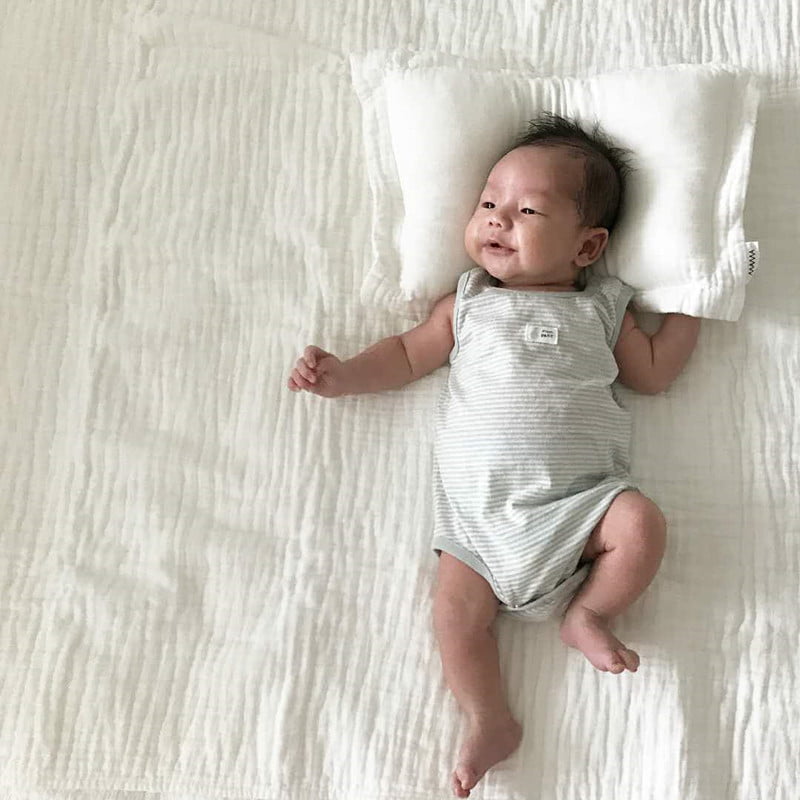Welcoming a newborn into the world is an exciting and joyous occasion. As parents, we strive to provide the utmost care and comfort for our little ones. One essential item that can assist in ensuring your baby's comfort during sleep and playtime is a newborn pillows. In this comprehensive guide, we will explore everything you need to know about newborn pillows, including their benefits, types, safety guidelines, how to choose the right one, how to use them effectively, as well as their pros and cons.
What Are Newborn Pillows?
Newborn pillows are specially designed cushions or supports created to provide comfort, proper positioning, and support for infants. These pillows are typically smaller and more contoured compared to adult pillows, ensuring a safe and comfortable experience for newborns. They are primarily used during sleep and playtime, supporting the baby's head, neck, and spine.
Benefits of Newborn Pillows:
Enhanced Comfort: Newborn pillows offer a cozy and soft surface for babies to rest their delicate heads. The cushioning provides additional comfort, helping newborns relax and sleep more soundly.
Prevention of Flat Head Syndrome: Newborns have delicate skulls, and spending excessive time in one position can lead to flat head syndrome. Specially designed newborn pillows can help distribute pressure evenly, reducing the risk of this condition.
Proper Alignment: Newborn pillows assist in maintaining proper alignment of the head, neck, and spine. They provide gentle support, preventing strain or discomfort in the baby's developing body.
Aid in Digestion: Certain newborn pillows have an inclined design, promoting digestion and reducing acid reflux. This elevation helps prevent regurgitation and discomfort after feeding.
Support during Tummy Time: Newborn pillows with appropriate contours can facilitate tummy time exercises, promoting neck strength, motor skills, and overall development.
Types of Newborn Pillows:

Flathead pillows: These pillows are designed to prevent or correct flat head syndrome and typically have a concave shape that supports the baby's head in a natural position.
Wedge Pillows: Wedge-shaped pillows elevate the upper body to aid digestion, reduce acid reflux, and promote easier breathing.
Multi-functional Pillows: These pillows serve multiple purposes, offering head and neck support, as well as cushioning for tummy time and sitting support.
Travel Pillows: Compact and portable, travel pillows provide comfort and support for newborns while on the go.
Organic Pillows: Made from natural and hypoallergenic materials, organic newborn pillows are ideal for babies with sensitive skin or allergies.
Safety Guidelines for Newborn Pillows:

Consult with a healthcare professional: Before using any newborn pillow or positioning aid, it's advisable to consult with your pediatrician or a healthcare professional. They can provide specific guidance based on your baby's individual needs.
Firm and flat surface: Newborns should always sleep on a firm and flat surface, such as a crib mattress or bassinet. Avoid placing pillows or pillow-like objects directly under your baby's head while sleeping.
Use approved pillows: If you are considering using a newborn pillow, choose one that is specifically designed and approved for infants. Look for pillows that meet safety standards and guidelines set by relevant authorities.
Age appropriateness: Follow the manufacturer's recommended age guidelines for the use of the pillow. Some pillows are designed for newborns, while others may be suitable for older infants.
Supervised use: Always use newborn pillows under close supervision. Do not leave your baby unattended while using a pillow. It's essential to keep a constant eye on your baby's position and ensure they are comfortable and safe.
Proper positioning: If you are using a newborn pillow to help with positioning, make sure it doesn't restrict your baby's movement or impede their breathing. The pillow should provide gentle support and maintain the natural alignment of your baby's head, neck, and spine.
Avoid suffocation hazards: Steer clear of pillows with loose or excessive padding, ribbons, strings, or other potential choking or suffocation hazards. Remove any pillows or stuffed animals from the sleeping area.
Temperature regulation: Ensure that your baby does not overheat while using a newborn pillow. Maintain a comfortable room temperature and dress your baby in appropriate clothing.
Regular monitoring: Continuously monitor your baby's comfort, breathing, and overall well-being while using a newborn pillow. If you notice any signs of discomfort or distress, discontinue the use of the pillow immediately
How to Choose the Right Newborn Pillow:
When it comes to choosing the right newborn pillow, there are several factors to consider to ensure your baby's comfort and safety. Here are some guidelines to help you make an informed decision:
Safety: The safety of your newborn should be the top priority. Avoid using pillows for babies under one year old as they can pose a suffocation hazard. The American Academy of Pediatrics (AAP) recommends keeping the crib free of any soft bedding, including pillows, blankets, and stuffed animals.
Age appropriateness: If you're looking for a pillow for an older baby who has transitioned out of the crib, ensure that the pillow is suitable for their age. Typically, pillows designed for toddlers aged 1 year and above may have more supportive features while still being safe.
Material: Opt for pillows made from hypoallergenic and breathable materials to minimize the risk of allergies and ensure proper air circulation. Natural fibers like cotton or bamboo are often good choices.
Size and shape: Newborn pillows should be small and appropriately sized for your baby's head. Avoid using oversized pillows that can restrict movement or cover the face. A flat pillow or a contoured pillow that supports the natural shape of the head may be more suitable.
Firmness: Look for a pillow that offers gentle support without being too soft or too firm. A pillow that is too soft may increase the risk of suffocation, while a pillow that is too firm may cause discomfort.
Easy to clean: Babies can be messy, so choose a pillow with a removable and washable cover. This makes it easier to maintain cleanliness and hygiene.
Recommendations and reviews: Read reviews from other parents and seek recommendations from trusted sources, such as pediatricians or parenting forums, to get insights into the best newborn pillows available in the market.
How to Use a Newborn Pillow Safely:

Follow Manufacturer's Instructions: Carefully read and adhere to the instructions provided by the manufacturer for proper usage and safety guidelines.
Place Pillow on a Firm Surface: Always place the newborn pillow on a firm and flat surface, such as a mattress or playmat, ensuring stability and reducing the risk of suffocation.
Supervise During Use: Keep a close eye on your baby while they are using the pillow, especially during sleep or tummy time. Supervision is essential for their safety.
Avoid Overuse: Limit the duration of pillow usage to avoid dependency and promote natural development.
Transition to Larger Pillows: As your baby grows and reaches developmental milestones, transition to larger pillows appropriate for their age and needs.
Pros of Newborn Pillows:
Improved Comfort: Newborn pillows provide additional comfort and support for babies during sleep and playtime.
Prevention of Flat Head Syndrome: Properly designed pillows can help distribute pressure and reduce the risk of flat head syndrome.
Aid in Digestion: Certain pillows with an inclined design assist in digestion and reduce acid reflux in infants.
Facilitation of Tummy Time: Newborn pillows with appropriate contours promote tummy time exercises and strengthen neck muscles.
Portability: Travel-friendly pillows allow parents to provide comfort and support for their baby while on the move.
Cons of Newborn Pillows:
Risk of Suffocation: Improper use or pillows with loose or soft surfaces can pose a suffocation hazard to newborns.
Limited Long-Term Use: Newborn pillows are designed for infants and may need to be replaced as your baby grows and develops.
Dependency: Excessive reliance on pillows may hinder natural development and the ability to self-soothe during sleep.
Not Recommended for Cribs: It is generally advised not to use pillows in cribs to reduce the risk of suffocation.
Individual Preference: Each baby is unique, and while some may benefit from newborn pillows, others may find them uncomfortable or unnecessary.
Conclusion:
Newborn pillows can be valuable aids in providing comfort, support, and safety for your little one. By understanding the benefits, types, safety guidelines, and considerations for choosing and using newborn pillows, you can make an informed decision to ensure the well-being of your baby. Remember, safety and supervision are paramount when using newborn pillows, and each baby's needs may vary. Always prioritize your baby's comfort and consult with healthcare professionals if you have any concerns.

